Quick links for drug and alcohol rehab in Ipswich
- Can You Help Me Guide a Friend or Loved One Into Drug and Alcohol Rehab in Ipswich?
- Alcohol Addiction and Rehab in Ipswich
- How Do I Know If I Need Drug and Alcohol Rehab in Ipswich?
- Intervention: The Steps Before Drug and Alcohol Rehab in Ipswich
- Accepting Drug and Alcohol Rehab in Ipswich: Relevant Information
- How Long Will I Need to Attend Drug and Alcohol Rehab in Ipswich?
- What Types of Therapies Are Offered at Drug and Alcohol Rehab in Ipswich
- Why Does the Abstinence Method Work Best at Drug and Alcohol Rehab in Ipswich?
- Mental Health Support at Drug and Alcohol Rehab in Ipswich
- Relapse Prevention – Aftercare After Drug and Alcohol Rehab in Ipswich
If you reside in Ipswich, it can be helpful to understand the situation surrounding drugs and alcohol in order to reflect on your own behaviour or someone else’s.
Getting help at any stage of misuse can be more than critical for eventual recovery and even suicide prevention – help is never far away, but awareness of the problem is critical.
For help accessing drug and alcohol rehab in Ipswich, please call our 24-hour helpline today on 0800 326 5559
Ipswich Addiction Statistics: Drugs

Two men talking at a drug and alcohol rehab in Ipswich
In 2017, the BBC reported that children were being regularly used in Ipswich to transport drugs, being targeted by London drug gangs. These young children were vulnerable, and these groups were taking full advantage of that.
The report stated that young children and adults had been reported missing and later found in addresses known for Class A dealing in Suffolk. Jubilee Park was one of the listed areas, with homes being taken over as bases for drug dealers.
This article was not on its own, and many published websites have statistics relating to drug and alcohol abuse in Ipswich.
There were twice as many more drug-related deaths compared to the previous year in Ipswich, as held by the Office for National Statistics.
Of those in rehab treatment for drug use, around 70% are opiate users, and almost half of deaths (nationally) are related to opiates such as heroin.
Babergh and Mid Suffolk seem to have the lowest numbers of drug poisonings in Suffolk, whilst Ipswich and West Suffolk appear to be on the rise, whereas East Suffolk seems to have the highest rates of drug-related deaths.
The average drug and alcohol crime rate in Ipswich is another clear indicator of just how serious this condition is:
| Drug and Alcohol Crime Statistics in Ipswich (2022-2023) | Value |
|---|---|
| Annual Crime Rate in Ipswich | 1.8 crimes per 1000 workday people |
| Crime Rate in Ipswich Compared to the National Rate | 65% |
| Drug and Alcohol Crime Percentage in Ipswich | 2.5% |
| Total Drug and Alcohol Crimes in Ipswich | 1.0k |
| Year-over-Year Decrease in Drug and Alcohol Crimes | 9.1% |
| Drug and Alcohol Crime Rate in Ipswich | 1.8 crimes per 1,000 working people per annum |
| Ipswich’s Rank in England and Wales’ Postcode Areas | 19 out of 99 postcode areas |
The University of Suffolk recently mapped their research into drugs in Suffolk, writing that around 750 individuals in the area were addicted to heroin.
This has caused outrage amongst locals due to the wrongful discarding of drug litter.
The council have provided ‘sharps bins’ in order for the areas of high usage to try and clear this matter, but areas are still littered with harmful substances.
If you see any drug litter, such as needles or gas canisters, ensure that you contact Ipswich Borough Council, as they are responsible for the safe and responsible disposal of items disposed of. You can reach them on 01473 433272.
Worried about your own addictive behaviour? Get help today from a drug and alcohol rehab in Ipswich by calling our team on 0800 326 5559
Can You Help Me Guide a Friend or Loved One Into Drug and Alcohol Rehab in Ipswich?
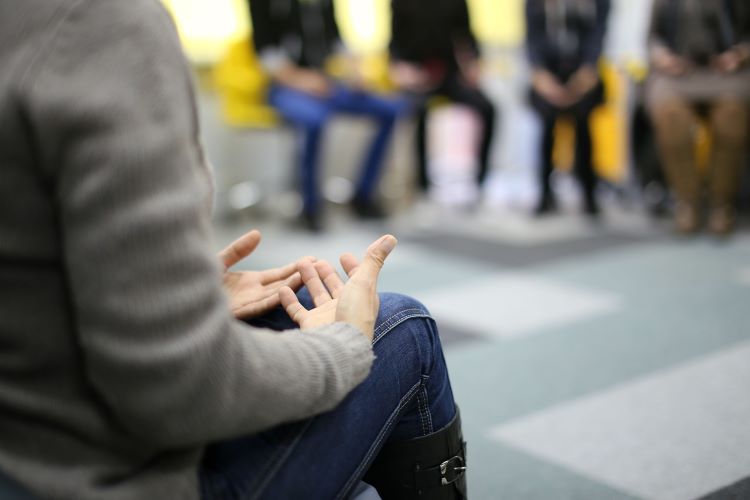
Group of people talking at a drug and alcohol rehab in Ipswich
Here at OK Rehab, we have many calls from concerned friends and relatives of those struggling with addiction.
We are happy to advise you and provide all the support we can. However, it’s important that you realise that nobody can be forced into attending drug and alcohol rehab in Ipswich.
We can help you understand the best way to approach your loved ones about their addiction and even organise an intervention alongside you and your family or support network.
If the person you are concerned about agrees to attend, you can take part in family therapy, which can be invaluable in aiding their recovery success.
They must agree to rehab, however, as a personal commitment to recovery is essential to the success of drug and alcohol rehab in Ipswich.
If you wish to know more about our services or would like to start an enquiry for yourself or a loved one at a drug and alcohol rehab in Ipswich, call us today on 0800 326 5559
Alcohol Addiction and Rehab in Ipswich

Therapist and patient talking together at a drug and alcohol rehab clinic in Ipswich
There has been a drinking ban with regard to alcohol and public places in Ipswich since 2007. This was accompanied by policies such as the removal of benches in public spaces in the hope this would prevent drinking gatherings.
This has had mixed reviews, as reported by the BBC: “I’m an alcoholic, and I need to have a drink when I get up to stop shaking. I need a good two-to-three litre of cider in the morning just to get over my shakes.”
Another woman stated, “I’ve had to get away from Felixstowe for domestic violence. I’ve let two people in my flat and had two mobile phones nicked”.
NORCAS released some shocking figures on alcohol abuse in Ipswich, stating that over 90,000 people are hazardous drinkers in Suffolk.
It appears that the current strategies for street alcoholics are not in local favour, as the council are lacking detox programmes. Removing benches and pouring away alcohol found will not be enough to beat addiction.
However, there has been a recent founding of ‘The Umbrella Trust’, a charity looking to establish itself as a drop-in centre (Black Horse Lane).
They aim to address the underlying causes and issues of using drugs and alcohol, analysing habitual behaviour that seems impossible to stop.
Drinking has significantly reduced to around 65 on-street regular drinkers in Ipswich, a number they aim to reduce further.
Don’t let alcohol addiction control your life – get help from a first-class drug and alcohol rehab in Ipswich by calling our expert team on 0800 326 5559
How Do I Know If I Need Drug and Alcohol Rehab in Ipswich?
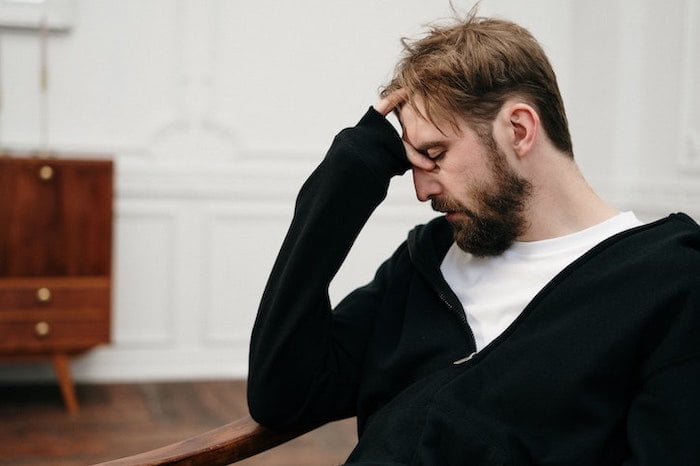
Man holding his head at a drug and alcohol rehab centre in Ipswich
Once you have become aware of your own – or someone else’s – different behaviour, alarm bells might be ringing.
The first thing you need to do before making any judgements is to assess whether you or a loved one is addicted to drugs or/and alcohol.
Addiction is regularly defined as a lack of control. Apply this to drugs and alcohol, and we are talking about a harmful lack of control.
Addiction is commonly associated with:
- Secretive behaviour: hiding or lying about whereabouts or relations with people
- Change in behaviour: sleep patterns and eating behaviours can commonly change when an individual becomes addicted to substances such as drugs and alcohol.
- Isolation: users tend to isolate themselves and reduce time spent with relatives or friends
- Lack of responsibility: users will stop either working or attending functions they used to, sometimes in fear that people will find out about their misuse.
- Change in appearance: hygiene is usually pushed back in importance, and users tend to stop placing importance on appearance.
Think you might be suffering from addiction? Talk it over with our experts on 0800 326 5559
The CAGE Questionnaire at Drug and Alcohol Rehab in Ipswich
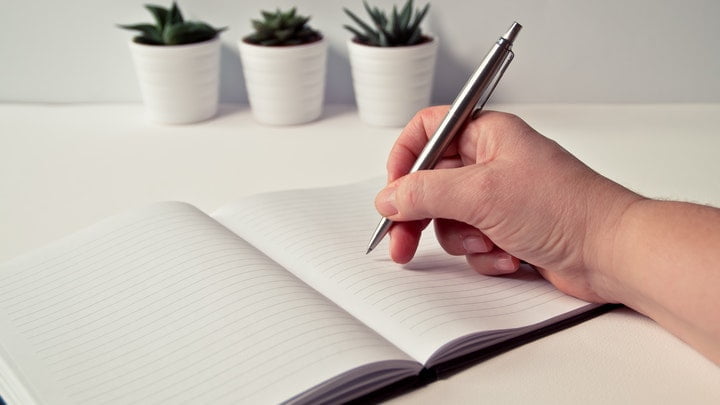
Person taking notes at a drug and alcohol rehab in Ipswich
The CAGE Questionnaire is a few questions that can be adapted to drug use also (CAGE-AID questionnaire). It is commonly known to highlight alcohol dependency for rehab treatment and point out heavy use or disorder:
- Have you ever felt you should cut down on your drinking?
- Have people annoyed you by criticizing your drinking?
- Have you ever felt bad or guilty about your drinking?
- Have you ever had a drink first thing in the morning to steady your nerves or get rid of a hangover (eye-opener)?
Each question is answered on a YES (1) or NO (0) basis, and the higher the score, the more likely you are to have a hazardous drinking or drug problem.
If you score above two, it is likely you have a clinical problem with substances and will experience withdrawal.
Another tool for alcohol screening is called FAST, designed as a tool to analyse harm.
An overall score of three or more is labelled FAST+. If you are FAST+, you are required to complete the AUDIT questions.
To learn more about how the CAGE Questionnaire can help you come to terms with your addiction and access the right treatment at a drug and alcohol rehab in Ipswich, call our team on 0800 326 5559
FAST Questionnaire at Drug and Alcohol Rehab in Ipswich

Therapist taking notes with a patient at a drug and alcohol rehab clinic in Ipswich
- How often have you had six or more units, if female or eight or more if male, on a single occasion in the last year?
- How often during the last year have you failed to do what was normally expected from you because of your drinking?
- How often during the last year have you been unable to remember what happened the night before because you had been drinking?
- Has a relative or friend, doctor or other health worker been concerned about your drinking or suggested that you cut down?
AUDIT Questionnaire at Drug and Alcohol Rehab in Ipswich

Staff member sat waiting for patients at a drug and alcohol rehab centre in Ipswich
- How often do you have a drink containing alcohol?
- How many units of alcohol do you drink on a typical day when you are drinking?
- How often during the last year have you found that you were not able to stop drinking once you had started?
- How often during the last year have you needed an alcoholic drink in the morning to get yourself going after a heavy drinking session?
- How often during the last year have you had a feeling of guilt or remorse after drinking?
- Have you or somebody else been injured as a result of your drinking?
The more you drink or display harmful behaviour, the higher your score. If your score is above 16 in total, you indicate a high risk, with 20+ indicating addiction or dependence and are in need of formal rehab treatment.
Get the help you need from your ideal drug and alcohol rehab in Ipswich by calling us on 0800 326 5559
Why Am I Addicted?

Man holding his head next to water at a drug and alcohol rehab in Ipswich
There are many theories that attempt to answer the notion of addiction. Addiction is not a new or contemporary concept; addiction has been around since addictive substances were discovered.
The key element to understand here is that addiction is not a weakness, nor is it the fault of the user. Drug and alcohol ddiction is a leach on someone’s life, and that is why we are here to help.
Even the idiom ‘addiction’ emphasises the loss of control. People who misuse drugs and alcohol lose control of their actions, behaviours, and thought processes.
They are no longer in control of their own life but have become mere shadows of themselves.
A leading theory shows how addiction is a long-term brain disease, ultimately shifting how the neurons communicate within the brain. The disease model of addiction articulates this perfectly, explaining that, like treating a rash with cream, we can treat addiction.
This is helping break the common misconception that addiction is a moral choice and that the same rehab treatment will work for everyone. This is not the case, as drugs and alcohol disrupt how your brain works, literally hijacking the key regions.
For example, the brain is naturally designed to reward behaviours we deem healthy, such as exercise and socialising with friends. However, once drugs or alcohol gets introduced, this is rewired.
This means you are hooked into desiring the feeling of euphoria the drugs or alcohol provides you with, but also damaging the decision-making area of the vortex.
Once you become dependent, many people stop taking drugs or alcohol for the effects and instead take them to prevent unwanted withdrawals.
Addiction has been linked to certain genetics and environmental studies. It has been shown that if you have an addiction in your family or grow up around drug and alcohol abuse.
You are more than likely to pick up this behaviour yourself. Unfortunately, it’s like playing chess with you when you don’t agree to play.
To discover more about the many potential causes of addiction, call us today on 0800 326 5559
Intervention: The Steps Before Drug and Alcohol Rehab in Ipswich
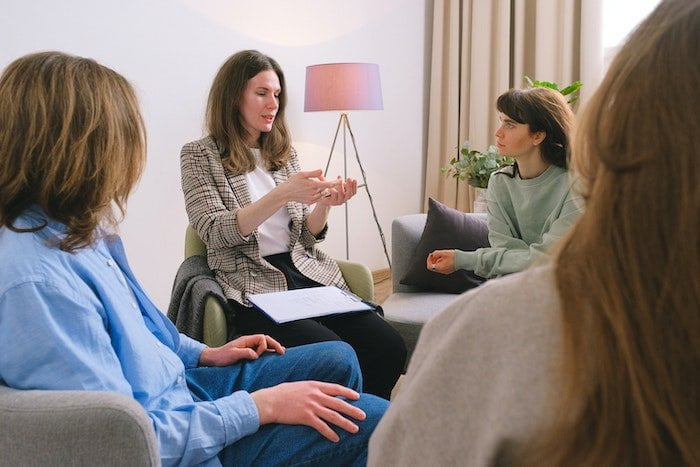
Therapist and patients talking together at a drug and alcohol rehab centre in Ipswich
Once you have recognised that someone needs help, intervention is the standard practice before turning to rehab in Ipswich. An intervention is staged to convince an individual that they need to seek help for a drug or alcohol dependency.
The definition of intervention is something that typically comes in-between things to change or alter their course. This is usually a meeting with close friends or relatives to explain they are concerned about misuse and its effects.
This conversation aims to persuade the person of concern into making positive changes, starting with the acceptance that they need help in the hope they go to rehab.
The classic steps for intervention include:
- Understanding the problem
- Identifying causes and contributing factors
- Decide on positive change
- Clarify how and when this can be done
- Test theory and adapt if required
The National Council on Alcoholism and Drug Dependence states that over 90% of interventions are successful when performed properly.
This is typically successful due to the understanding that is clarified about the risk of addiction and behaviours, with the identification of causes being a crucial element here.
Understanding how it affects significant others and the emotion behind it is a motivational cause for change.
Make sure that your loved one’s intervention is safe and effective by giving us a call on 0800 326 5559
The CRAFT Method of Intervention For Drug and Alcohol Rehab in Ipswich

Addiction recoveree speaking with a staff member at a drug and alcohol rehab in Ipswich
CRAFT intervention stands for Community Reinforcement And Family Training. CRAFT’s aim is to aid concerned others (COs) steer their loved ones away from drug and alcohol misuse using a reward system.
CRAFT is based on rewarding good and social behaviour and letting the consequences of bad behaviour have their effect and play out.
Families are urged to step back and allow the user to experience the negative effects of use, and because the ultimate goal is mental well-being, positive behaviour is positively reinforced.
This was founded by Meyers and Miller in the 1970s and is still avidly used in contemporary societies. CRAFT encourages:
- Determine the user’s triggers
- Communicate clearly about all aspects of life
- Use positive reinforcement for non-use and pro-social behaviour.
- Address the things that make the user unhappy
- Learn how to act if they fall off the wagon
In a trial, over 74% of families that signed up to CRAFT ended up seeking rehab treatment for substance abuse, a raging success.
For expert guidance on conducting a CRAFT intervention in Ipswich, give our team a call on 0800 326 5559
Accepting Drug and Alcohol Rehab in Ipswich: Relevant Information
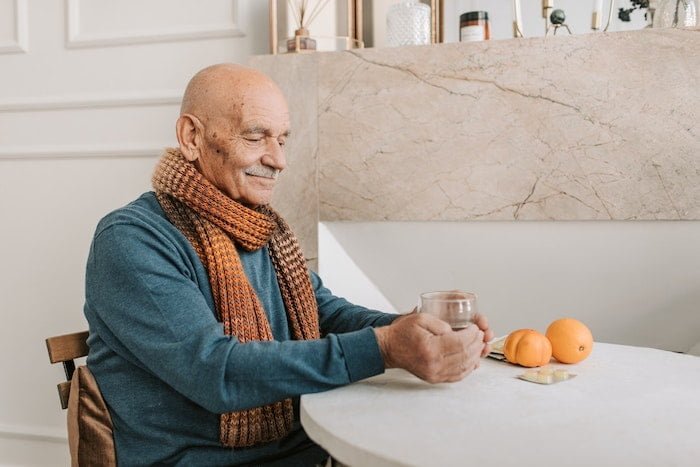
Older man sat with a hot drink and fruit at a drug and alcohol rehab centre in Ipswich
If you are trying to intervene in a user’s abuse, it is critical you know and understand how rehab in Ipswich works, including costs, types of rehab treatment and how long it is supposed to last.
The overarching notions of drug and alcohol rehab tend to stem from the celebrities in the public eye. These are the upmarket rehab centres, mostly inpatient and extremely expensive, as they have the means to pay for them.
This is not all that is on offer. There are two main types of rehab treatment:
- Outpatient: This is usually offered under the NHS and for free, as it is regular therapies and meetings at a clinic, but you will not live there. You will reside at home whilst attending regular sessions at a chosen clinic.
- Inpatient: inpatient rehab treatment asks that you temporarily move into the clinic in order to receive round-the-clock care from trained professionals. This usually lasts around 28 days and can vary in cost. The NHS almost never funds this type of treatment as it is costly for them, so you will be asked to pay for it upfront if necessary. However, many drug and alcohol rehab centres in Ipswich can offer flexible payment plans, such as a pay-as-you-go basis.
The cost for inpatient rehab treatments includes:
- Rent and utilities
- Medication and meals
- Training for staff
- Therapy and other treatments
Costs can range from £14,000 to £73,000 for a 28-day stay, so it is important you attend somewhere that suits your needs.
This is why it is rarely given to you on the NHS; there are many forms of counselling and therapy on offer for free, so do not feel like you are alone.
During inpatient rehab treatment, you will follow a structured treatment plan, and this can be necessary for your route to sobriety, depending on how bad your addiction is and what substance you are misusing.
For example, cannabis and cocaine are not physically addictive, but alcohol and heroin are, so these require differing rehab treatments. To know more about drugs and their effects, talk to Frank: https://www.talktofrank.com/
For assistance paying for drug and alcohol rehab in Ipswich, call our team on 0800 326 5559
Alcohol Rehab in Ipswich: Detox
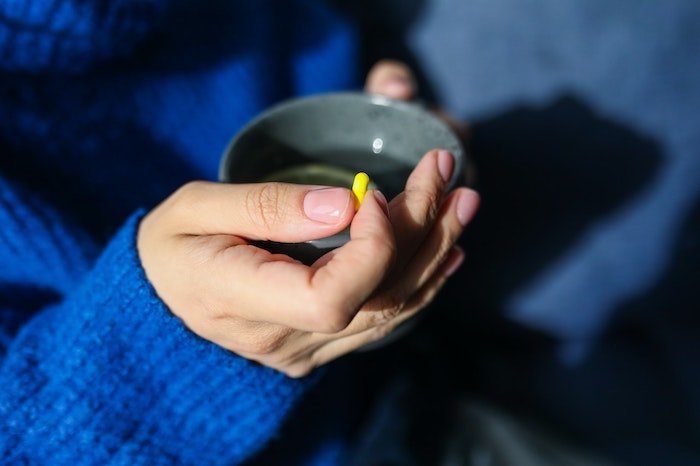
Person taking medication at a drug and alcohol rehab in Ipswich
As alcohol is an addictive substance, you will need to detox before starting therapy at alcohol rehab in Ipswich. This can be medication-assisted before engaging in therapy and aftercare.
If you are an outpatient, you will be required to pay for medication such as Librium if you are prescribed it. This is usually around £9 per prescription.
Librium aids the withdrawal symptoms of alcohol, helping prevent seizures and depressive episodes.
The minimum time to detox for alcohol is seven days, but 28 days is highly recommended in order to focus wholly on rehabilitation and recovery through therapy.
Librium is offered over the course of ten days, slowly reducing your intake in order to reduce the risk of addiction to Librium itself.
This is labelled pharmacological intervention; following a 10-day course of medication. You will receive around three weeks of therapy and rehab treatments to focus on the causes of addiction and accompanying emotions.
Make sure that your chosen drug and alcohol rehab in Ipswich is safe and effective by calling us on 0800 326 5559
How Long Will I Need to Attend Drug and Alcohol Rehab in Ipswich?

Woman sat with a drink looking at the countryside at a drug and alcohol rehab in Ipswich
In the same way that everyone will have a different experience of addiction, rehab in Ipswich will be different for everyone.
There are many factors that can affect how long you will need to spend in rehab treatment, and as addiction treatment is frequently monitored and adjusted to suit your changing needs, the goalposts for your discharge are moveable.
A typical drug and alcohol rehab programme in Ipswich will last for around 28 days. However, this will depend on what you are being treated for, how severe your addiction is, and your own personal commitment to recover.
It’s wise to keep a degree of flexibility and not be disappointed if your recovery takes a little longer than expected.
The important thing is that you’re making positive changes to your life and can achieve a long-term recovery with full commitment to your goals.
The other thing to be aware of is that when we talk about addiction recovery, we are not talking about an addiction cure. It’s incredibly important to understand the difference between recovery and cure.
Unfortunately, there is no known cure for addiction, although once recovery is achieved, it’s perfectly possible to maintain it indefinitely, with continued motivation.
Whilst the desire to concede to your addictive behaviours in the future will be dramatically reduced in recovery, it is likely to exist forever, and your recovery is a lifelong effort, although one that is very much worth maintaining.
To discover how long your stay at a drug and alcohol rehab in Ipswich is likely to last, call us today on 0800 326 5559
Where Can I Get Help in Ipswich?

Therapist and patient laughing together at a drug and alcohol rehab centre in Ipswich
Here are just a few of the many places you can seek drug and alcohol rehab help for free in Ipswich:
1. Suffolk Recovery Network (Turning Point)
Address: Sanderson House, 17-19 Museum St, Ipswich IP1 1HE
Telephone: 01473 220 240
Website: https://www.turning-point.co.uk/services/suffolk-recovery-network
2. CAMHS East and West Suffolk
Address: 2nd floor, Mariner House, 43 Handford Road, Ipswich, IP1 2GA
Telephone: 01473 237 055
3. ICENI Ipswich
Address: Iceni Ipswich, 74-78 Foundation Street, Ipswich, Suffolk, IP4 1BN
Telephone: 01473 214 006
Website: https://www.iceniipswich.org/
For help choosing a suitable drug and alcohol rehab service in Ipswich, call us today on 0800 326 5559
What Types of Therapies Are Offered at Drug and Alcohol Rehab in Ipswich
Cognitive Behavioural Therapy at Drug and Alcohol Rehab in Ipswich

Young person in a therapy session at a drug and alcohol rehab centre in Ipswich
CBT is a psychotherapy approach used at drug and alcohol rehab in Ipswich and is a solution-focused therapy based on emotive concepts. Developed as talking therapy, CBT helps users manage their negative thoughts and feelings that often lead to damaging behaviour.
This therapy breaks down overwhelming problems into manageable chunks, aiming to improve mental health. Here are some centres that offer CBT in Ipswich:
Smart CBT+: Mental Health Services
Address: 398 Foxhall Rd
Telephone: 07432 186 428
Lolita Toffi CBT Therapist/Counsellor
Address: 5 Anita Cl E
Telephone: 07888 754 665
Anita Jane Counselling
Address: 311A Foxhall Rd
Telephone: 07388 689 812
To ensure that you recieve the best possible treatment, talk to our experts on 0800 326 5559
Holistic Therapies at Drug and Alcohol Rehab in Ipswich

Paintbrushes set up for art therapy at a drug and alcohol rehab centre in Ipswich
Holistic therapy is integrative, incorporating the mind, body and soul in both traditional and non-traditional rehab treatments.
This can range from equine therapy to adventure therapy, aiming to realign the balance between mind and body, focusing on mental well-being.
There are many other types of therapy on offer, and researching the places in your area is critical in order for you to receive the care you need.
Remember, everyone is different; what works for someone else might not work for you. Remain open-minded about change; it is not a linear path.
Think holistic therapy might be right for you? Find out what is offered at a rehab in Ipswich by calling us on 0800 326 5559
Why Does the Abstinence Method Work Best at Drug and Alcohol Rehab in Ipswich?
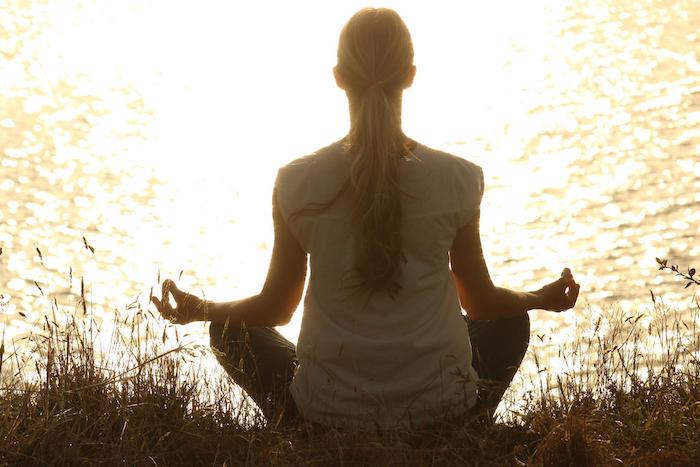
Woman meditating on a hill outside of a drug and alcohol rehab clinic in Ipswich
This really follows on from the last answer.
Because an addiction never really goes away, the ability to use drugs and alcohol at an accepted and safe level is near impossible for anyone who has a history of addiction.
Having an occasional drink or using drugs ‘just this once’ has the potential to cause a relapse and undo all of the hard work that you’ve committed to recovering.
The abstinence method is a proven rehab treatment that has been used by top rehab facilities for many years.
It was founded alongside the 12-step programme developed by Alcoholics Anonymous and continues to be used successfully around the world today
Please call our 24-hour helpline today on 0800 326 5559
What Sort of Addiction Treatments Are Commonly Used in Ipswich-Based Rehab Facilities?
During your admission to your chosen drug and alcohol rehab programme, a personalised rehab treatment plan will be developed on your behalf with input from your own experience with addiction, your medical history and following a proven structured approach to combined addiction treatment.
This will seek to address both the physical and psychological dependencies that you have formed with substances, as well as the underlying cause of your addiction.
Your treatment plan will be explained to you in detail and is likely to commence with detox.
A full detox is an essential part of any rehab treatment programme as it aids focus on your continued sobriety, as well as breaking down the physical dependence that your body has developed on drugs and/or alcohol.
Detox is a challenging process that can be risky. However, this will be the safest and most comfortable experience of detox that you could expect, given the professional care and monitoring throughout.
This minimises the chance of an emergency and will allow your withdrawal symptoms to be reduced and controlled as far as possible.
Please call our 24-Hour Helpline: 0800 326 5559
Mental Health Support at Drug and Alcohol Rehab in Ipswich

Two people hugging during a support session at a drug and alcohol rehab in Ipswich
Once detox is complete, you will begin a tandem of psychological intervention treatments.
These will vary based on your individual rehab treatment plan, however, are likely to include the following types of therapy:
- Cognitive Behavioural Therapy
- Family Therapy
- Group Therapy
- Individual Therapy
- Motivational Interviewing
- Motivational Enhancement Therapy
- Dialectic Behavioural Therapy
- Addiction education classes
This holistic approach to recovery aims to address the underlying cause of your addiction.
Whether there are pre-existing mental health conditions or a traumatic life event that has not been adequately dealt with, taking care of your overall mental health will be a significant priority throughout your recovery.
Some clients may receive a dual diagnosis throughout the course of their psychological rehab treatment, as even where no pre-existing mental health issues existed, the prolonged use of certain substances can create significant mental health struggles, with depression and anxiety being fairly common comorbidities.
Where this is the case, you will be referred for the appropriate psychological care, which will continue outside of your rehabilitation.
Many organisations across the UK offer free mental health support, whether you are also suffering from addiction or not.
Some of the most useful include Mind UK, Young Minds, Rethink Mental Illness, Samaritans and Papyrus.
Please call our 24-Hour Helpline: 0800 326 5559
Relapse Prevention – Aftercare After Drug and Alcohol Rehab in Ipswich
After rehab has been completed and has been a success, there are aftercare and support services available to you. This is to keep you on the path to recovery, as addiction is something that requires a constant struggle.
Remember, you are not alone. Many support groups exist devoted to helping to maintain your recovery through peer support.
These includ mutual support groups like Alcoholics Anonymous, Narcotics Anonymous and Cocaine Anonymous.
The 12-steps are the centre point of Anonymous groups, involving a program of personal growth that follows the lines of:
- We admitted we were powerless over alcohol – that our lives had become unmanageable.
- Came to believe that a Power greater than ourselves could restore us to sanity.
- Made a decision to turn our will and our lives over to the care of God as we understood Him.
- Made a searching and fearless moral inventory of ourselves.
- Admitted to God, to ourselves and to another human being the exact nature of our wrongs.
- We were entirely ready to have God remove all these defects of character.
- Humbly asked Him to remove our shortcomings.
- Made a list of all persons we had harmed and became willing to make amends to them all.
- Made direct amends to such people wherever possible, except when to do so would injure them or others.
- Continued to take personal inventory and, when we were wrong, promptly admitted it.
- Sought through prayer and meditation to improve our conscious contact with God as we understood Him, praying only for knowledge of His will for us and the power to carry that out.
- Having had a spiritual awakening as the result of these steps, we tried to carry this message to alcoholics and practice these principles in all our affairs.
Make sure that you beat addiction once and for all with the right relapse prveention plan – call us today on 0800 326 5559
SMART Recovery Programme
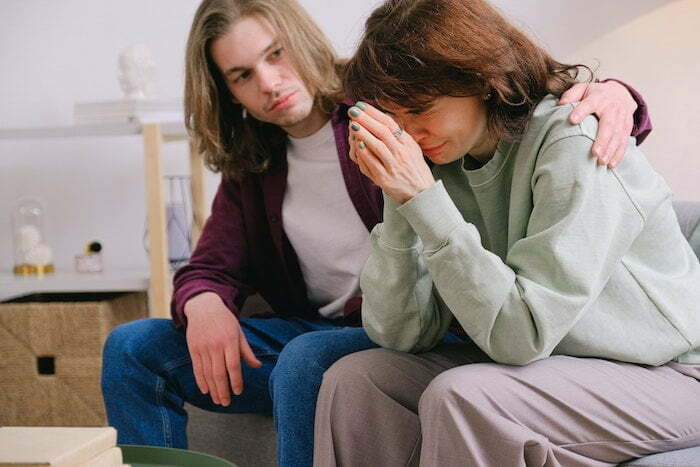
Man comforting a woman at a drug and alcohol rehab centre in Ipswich
SMART Recovery uses a secular four-point programme, building motivational tools for change.
- Building and maintaining motivation
- Coping with urges
- Managing thoughts, feelings and behaviour
- Living a balanced life
This programme is great for aftercare and provides loads of support for those that need it in a time of need.
These types of aftercare services help people that used to be dependent on drugs or alcohol fit back into a community.
This also offers a chance to address issues associated with your recovery and reminds you of how difficult recovery can be.
It is key to remember that addiction isn’t abnormal; there are millions struggling with addiction, and that is why we are here to support you.
Discover your treatment options by calling us on 0800 326 5559
How Can OK Rehab Help Me to Access Rehab Services in Ipswich Immediately?

Man talking on the phone at a drug and alcohol rehab centre in Ipswich
A common problem for those with addiction who are looking to recover is quick and efficient access to appropriate rehab treatment.
There are addiction recovery programmes available through the NHS; however, unfortunately, the high demand for this type of service, coupled with severe underfunding in the area, means that waiting lists are extremely long.
The trouble with long waiting lists is that, sadly, some people don’t get help in time. There’s also the potential to lose your desire to recover.
The longer you have to consider rehab and the more intense your addiction becomes, there is a chance you will decide not to go through with the treatment when it does finally become available.
Here at OK Rehab, we can refer you to one of our partner rehab facilities, all of which offer leading private rehab treatment programmes.
After a short assessment to ascertain the level of your addiction and determine which type of rehab treatment is most suitable for you, we can immediately refer you via pre-admission to one of our local partner facilities.
Those who begin rehab as soon as possible after making the decision are the most likely to succeed in achieving long-term recovery.
Our team at OK Rehab are ready to help you choose a drug and alcohol addiction recovery service in the Ipswich area today.
We can arrange a mutually agreeable admission date as soon as you’re committed to your recovery goals.
All of our partner centres operate under strict guidelines set by the Care Quality Commission. and regardless of your budget, you will have access to high-quality care from professionally trained medical staff.
Get help for addiction across Suffolk including in Bungay, Beccles, Bury St Edmunds, Stowmarket, Newmarket, Barton Mills, Southwold, Aldeburgh, Halesworth, Woodbridge, Leiston, Felixstowe, Framlingham, Dunwich and many others.
Please call our 24-hour helpline today on 0800 326 5559





